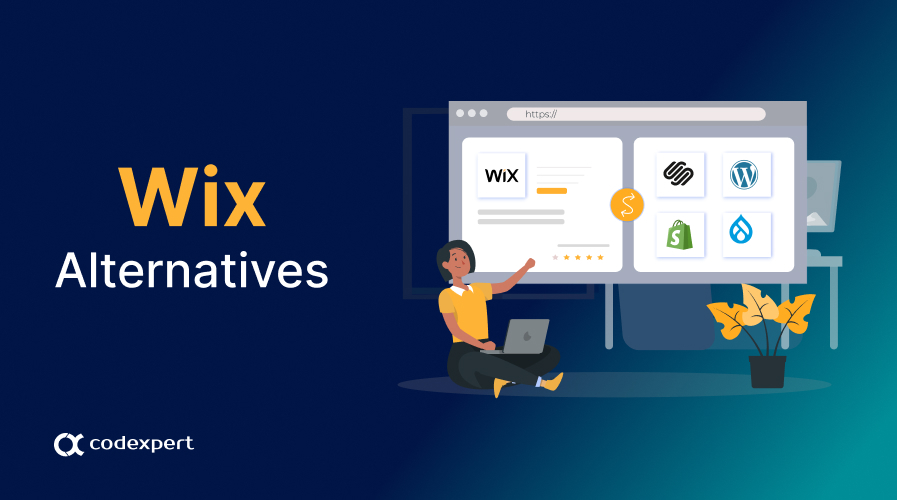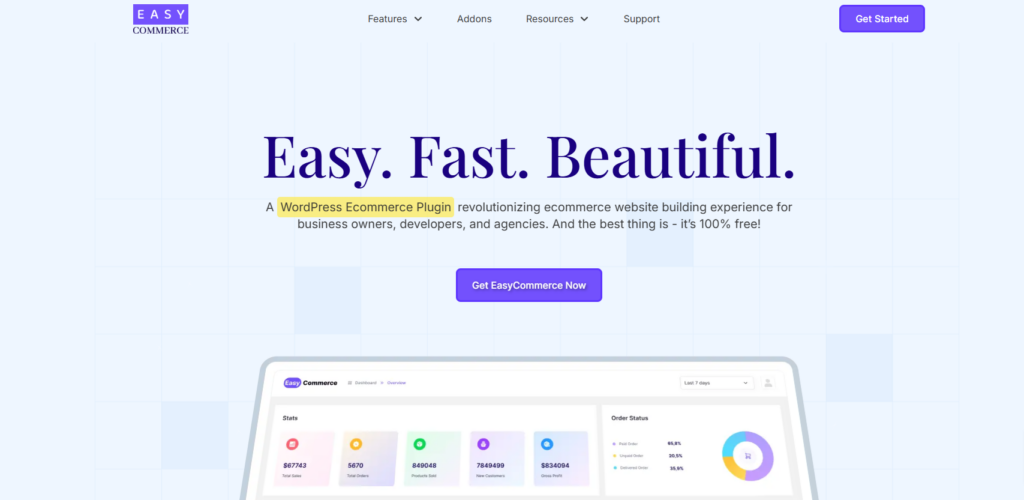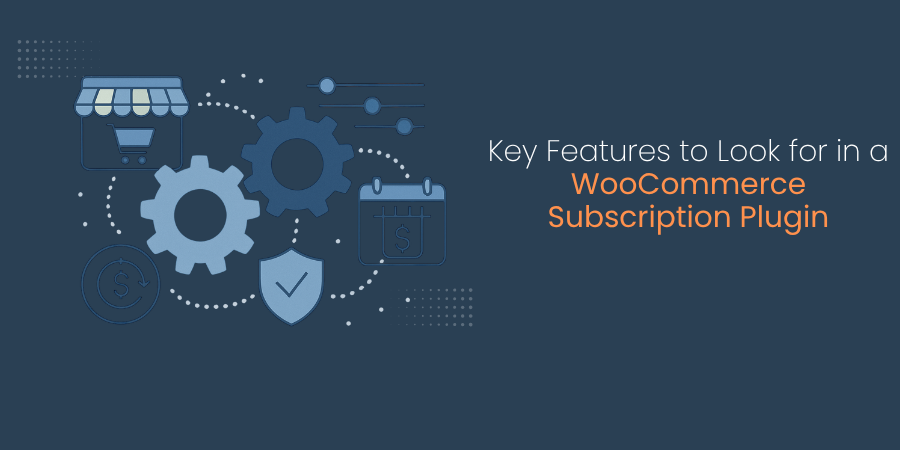9 Wix Alternatives to Consider in 2025

Looking for a Wix alternative? We’ve found the perfect options for you!
Wix is a widely popular platform for creating stunning websites, but it’s not the only option out there. Several options are available with exquisite features and pricing. While the list of Wix alternatives is extensive, many users are tempted to stick with what they know. However, don’t fall into that trap—exploring other options could lead to even better results!
Wix is a great platform, but it’s important to explore other options to find the one that best suits your business needs. We’ve narrowed down the eight best Wix alternatives that could be the perfect long-term partner for your business.
Let’s dive right in!
Quick Overview of the Wix Alternatives
| Platform | Ease of Use | Best For | Pricing | Customization | E-commerce | SEO Tools |
| Wix | Easy | Small businesses, personal sites | $16-$59/month | Limited without coding | Basic plans available | Good, built-in wizard |
| EasyCommerce | Very easy | Small to medium sized businesses | Free (with hosting and plugin costs) | Highly customizable | Excellent, built-in | Great, via plugins |
| WordPress | Moderate, steeper learning curve | Customization | Free (with hosting costs) | Highly customizable | With plugins | Excellent, via plugins |
| Squarespace | Easy | Creative professionals, portfolios | $16-$52/month | Limited without coding | Good, built-in | Good, built-in |
| Shopify | Easy | E-commerce | $25-$2300/month | Limited without apps | Excellent, built-in | Good, with apps |
| Webflow | Moderate | Website building | $14-$39/month | Highly customizable | Available | Advanced, built-in |
| Weebly | Easy | Small business | $6-$26/month | Limited | Basic plans available | Basic, built-in |
| Drupal | Difficult, requires coding | Large, complex websites, Developers | Free (with hosting costs) | Highly customizable | With modules | Advanced, manual setup |
| Contentful | Moderate, content-driven sites | Content management | $300 to Custom pricing | Headless, fully flexible | None | Advanced, manual setup |
| Duda | Easy | Multilingual sites | $25-$199/month | Moderate | Basic plans available | Good, built-in |
Why Look for Wix Alternatives?
Wix is a popular website builder that was launched in 2006. It’s loved by everyone for its user-friendly, drag-and-drop interface. Wix helps both individuals and businesses easily create stunning websites with its vast array of templates and built-in tools. Even those with zero coding knowledge can make functional websites.
However, Wix has downsides too, that can be resolved by moving to a different platform. Here are a few reasons to consider Wix alternatives:
- Wix is on the pricier side compared to its alternatives—the cheapest plan left out essential tools like report and analytics. There are a few cheap platforms available in the market that you can try.
- This platform offers generic templates with few customization options. If you want to make your website visually appealing, you should look for Wix alternatives.
- Wix does not offer all kinds of features for every business, so it would be a good idea to look for alternatives that perfectly align with your company.
- Wix is heavier than other alternatives, which can cost you loading time. Various lightweight platforms are available to take your website to the next level with fast loading.
- This platform does not allow you to own your website fully. As it is hosted on Wix, if their website has issues, you will not be able to access your website either.
Here are the alternatives, categorized by the types of businesses they are best suited for –
- WordPress: Best for customization.
- EasyCommerce: Best for WordPress e-commerce.
- Squarespace: Best for designs and creative professionals.
- Shopify: Best for e-commerce business and scaling online stores.
- Webflow: Best for website building and designing.
- Weebly: Best for small businesses and first-time shop owners.
- Drupal: Best for developers.
- Contentful: Best for omnichannel marketers.
- Duda: Best for multilingual sites.
9 Best Wix Alternatives
1. WordPress

WordPress is a free and open-source platform that powers over 43.3% of all CMS platforms. Launched in 2003, it started as a blogging site and eventually became a versatile As an open-source platform, WordPress is an ideal choice for anyone looking to create a truly unique website. Its vast community continually updates and improves the platform to ensure it stays current and versatile.
With over 60,000 plugins and 10,000 themes available, WordPress offers endless possibilities for customization and functionality, allowing you to bring your vision to life. WordPress gives you full control over your website; all you need to do it buy a hosting and domain to start it. Even with zero coding knowledge, you can easily create stunning websites for free!
What are the Pros?
- WordPress is entirely free and open source. You can play around with this platform or create your website without any cost.
- It gives you full control over your website. You own the data on your website, which can be moved to a different hosting anytime you want.
- WordPress has thousands of plugins to customize and personalize your website.
- WordPress is great for SEO. You can have SEO plugins and
What are the Cons?
- With a steep learning curve, and installing WordPress can be complex.
- Maintaining security and maintenance solely depends on you, so you need to keep a close eye on your website.
- To get support from WordPress, you’ll need to browse through the support forums and documentation.
Price
WordPress is completely free and open source. To make a functional website, you just need to spend money on a reliable Domain and Hosting.
WordPress vs Wix
WordPress is a free and open-source platform that allows anyone to create a website with complete control. In contrast, Wix offers a more limited, rented digital space. If you’re looking to build a fully customized website, WordPress provides the flexibility to add features and functionality as your needs evolve.
2. EasyCommerce

If you like Wix’s sleek design but want more control over your online store, EasyCommerce is a great alternative. Unlike Wix, which is a fully hosted website builder, EasyCommerce is a plugin that adds e-commerce functionality to your WordPress website.
This means you can customize every aspect of your store using WordPress themes and plugins while still adding advanced e-commerce features. EasyCommerce is also built with performance in mind. It’s optimized for fast loading speeds that ensures a smooth shopping experience that can help reduce bounce rates and improve conversions.
Plus, because it runs on WordPress, you have more control over your website’s SEO, giving you an edge in search engine rankings compared to Wix’s built-in SEO tools.
What are the Pros?
- More Design Flexibility: Since EasyCommerce works with WordPress, you can choose from thousands of themes and fully customize your store’s look.
- Better Scalability: EasyCommerce keeps product data seperate from the other database tables, so the room for scalability is endless.
- Smooth Inventory and Order Management: Track products, manage orders, and automate taxes and shipping calculations with ease.
What are the Cons?
- Requires a WordPress Website: Unlike Squarespace, which offers an all-in-one solution, you need to have a WordPress site first.
Price
EasyCommerce is free to download and use, but some premium themes and advanced features may require additional payments.
EasyCommerce vs Wix
When choosing a platform for your online store, Wix and EasyCommerce cater to different needs. Wix is a beginner-friendly, all-in-one website builder with built-in e-commerce features, while EasyCommerce is a WordPress plugin that transforms an existing WordPress site into a fully functional online store.
If customization and scalability are priorities, EasyCommerce + WordPress is a strong Wix alternative that gives you more flexibility over your e-commerce store.
3. Squarespace

Squarespace is a user-friendly platform, famous for its stylish templates and intuitive interface. It was initially launched in 2004 and quickly gained popularity due to its all-in-one approach. This website builder offers hosting, domain registration, and e-commerce tools, all under one roof.
This website builder has all the tools to create a visually appealing website, which makes it a perfect choice for artists, designers, and small businesses. It also provides hand-picked essential features and themes to avoid complexity. Anyone looking for a creative website builder with less complexity will love Squarespace.
What are the Pros?
- Squarespace is a haven for creative professionals, offering a wide selection of carefully curated templates to choose from.
- Its user-friendly drag-and-drop editor is straightforward and easy to navigate.
- Squarespace allows website editing through their mobile app, which brings flexibility in editing and managing websites.
- Get access better blogging tools to increase flexibility to the blogs on your website.
What are the Cons?
- The customization through code is limited.
- Squarespace has a limited market for apps and third-party integrations.
- Switching to a new theme is difficult without losing content or functionality.
- There’s less freedom in the layout structure.
Price
Squarespace offers various premium plans. The monthly plan starts from $16 and goes up to $52.
Squarespace vs Wix
Squarespace is renowned for its designs and beautiful templates. It is the best option if you want to create an eye-catching, stunning website. And unlike Wix, Squarespace has limited templates, dedicated to personalization. Any creative personnel and designers will love working with Squarespace.
4. Shopify

Shopify is a leading e-commerce platform that helps businesses of all sizes design online stores and offers comprehensive tools to manage them properly. It was first launched in 2006 and gained popularity quickly due to its scalability.
With its templates, Shopify lets you create responsive, professional websites, so whether you are launching a startup or looking to scale your business, Shopify offers all types of powerful tools to get you started on your path to success.
What are the Pros?
- Shopify is carefully designed to meet the unique needs of business owners with its set of powerful features.
- Its dedicated inventory management functions make it easy to scale businesses.
- It has an extensive app market to choose from, making it easy for businesses of all types to operate.
- Shopify has strong security measures in place, so you can rest easy knowing your websites are always protected.
- You can easily sell products on multi-channels and add integration through Shopify.
What are the Cons?
- The URL structure of Shopify is not flexible, making it unsuitable for SEO.
- Shopify does not offer multilingual options to create layouts in different languages.
- Some advanced features are too complex and may require technical knowledge.
Price
Shopify has four distinguished premium plans, which can be paid monthly or yearly. The monthly plans start from $25 to $2300 (Negotiable).
Shopify vs Wix
The main difference between Wix and Shopify lies in its extensive feature set. Shopify is the best option if you need to scale your business quickly. Uploading and managing products on Shopify is easy, as all of its features are found in your dashboard. Also, the platform’s complete inventory management tool will give you an extra edge in managing your stock.
4. Webflow

Webflow is specifically designed for designers and developers looking to create fully-customizable websites. This website builder lets its users create responsive and pixel-perfect websites using an intuitive drag-and-drop interface. Simultaneously, Webflow has advanced features like interactions, animations, HTML, CSS, and JavaScript.
This platform also enables multi-purpose use by building and managing an online store. Its powerful hosting and SEO tool make it the perfect space for creating a fast and functional website. Webflow is perfect for designers and development agencies seeking complete control over their websites while having access to an advanced set of tools.
What are the Pros?
- Webflow features a built-in CMS, making it ideal for managing and creating dynamic websites with ease.
- You can easily export clean, ready-to-use HTML, CSS, and JavaScript, which is a huge time saver for developers.
- Webflow offers unparalleled customization options and design options.
- It has reliable hosting and SEO options for better speed and reach.
What are the Cons?
- Webflow has a steeper learning curve that can be complex for beginners.
- The cost is on the higher side, so small businesses may want to avoid this platform.
- This has limited customer service options, which can be a problem in the long run.
Price
Webflow offers free plans with scalable premium plans. The monthly plans start from $14 to $39. There are other scalable options for which you can directly contact them.
Webflow vs Wix
If you’re looking for greater flexibility and design freedom, Webflow is your best option. This platform offers a comprehensive set of tools to meet your needs, including a powerful CMS and the ability to export code—features that Wix doesn’t offer. With its advanced tools and features, Webflow has become a go-to choice for many users.
5. Weebly

Weebly is a popular website builder known for its exceptional ease of use. This is an excellent choice for small businesses and beginners who want to create a professional website. With an intuitive drag-and-drop interface, Weebly makes the whole setup process straightforward and even offers built-in e-commerce features.
Weebly also provides reliable hosting services and responsive mobile designs. While it may not offer much flexibility or advanced features, its simplicity and ease of use make Weebly a standalone choice!
What are the Pros?
- It is a user-friendly platform with a drag-and-drop function to simplify the process.
- Weebly has an affordable pricing plan and is significantly cheaper than Wix.
- You can also sell your products on free plans too. So it won’t cost you anything to start a business.
What are the Cons?
- The templates are not visually appealing.
- Weebly offers limited customization options.
- There are no dedicated marketing tools that can be used to boost SEO.
Price
Weebly is a free web builder. Monthly premium plans start at $10 and extend to $26.
Weebly vs Wix
With Weebly, you can easily launch your business for free and scale to other platforms if needed. Its straightforward e-commerce tools make it an excellent option for small businesses. While Weebly may not offer the advanced features of Wix, its user-friendly interface and essential tools make it a more practical option for many business owners.
6. Drupal

Drupal is a highly flexible and powerful content management system that’s widely known among developers and agencies that require strong customization tools. Unlike the other alternatives, Drupal offers extensive control over the layout, content management, and functionality. The standout feature of Drupal is its modules. They allow you to scale your business to any level you desire.
Drupal strongly focuses on security and performance, which makes it a reliable choice for developers. Websites built with Drupal can easily handle high traffic. While it has a steeper learning curve and offers advanced functionality, these features make Drupal ideal for developers, making it a strong alternative worth considering.
What are the Pros?
- Drupal is highly customizable because of its extensive module collections, which can make any website unique.
- Drupal has strong security options and provides regular updates to fix any bugs.
- This platform provides out-of-the-box support for multilingual websites. This function is essential for globalizing your business.
- The advanced user role and permission system allows you to control what users can see and do on your website.
What are the Cons?
- A Drupal website often needs more server space to run properly as it contains many features and tools.
- Drupal websites are highly customizable, so they are not easy to make. You need to have sound technical knowledge to make a website with Drupal.
- It is unsuitable for small businesses and shops because of the steep learning curve.
Price
Drupal is free to download, but to make your website fully functional, you need to buy a domain, hosting, and premium extensions or themes.
Drupal vs Wix
You should choose a Drupal platform over Wix if you want to highlight and customize your website. Drupal also offers advanced features and modules to scale your business. Its components provide developers space to maintain granular control over their websites.
7. ContentFul

Contentful is a powerful platform for managing and editing content across digital channels. With its powerful content management tools, businesses can create and control digital content all in one place.
Unlike traditional CMS platforms, Contentful separates content management from presentation, providing flexibility in delivering content across websites, mobile apps, IoT devices, and more.
Developers value its API-first approach, making it particularly well-suited for enterprises and growing businesses that need adaptable content management tools to support diverse digital experiences.
What are the Pros?
- Contentful is highly scalable, so you can start with a small business and scale it accordingly.
- There are advanced content modeling features to help you with the content structure and any other specific requirements.
- Contentful offers localized support that can be quite helpful when dealing with errors.
- Its advanced editorial workflow and collaboration tools help with teamwork.
What are the Cons?
- The setup can be complex for beginners and needs some technical expertise.
- This platform mainly revolves around content management features.
Price
You can start with Contentful for free. If you want to upgrade your services, there are two premium plans. The monthly basic plan costs $300, and you must contact them for the premium custom plans.
ContentFul vs Wix
The key difference between these two platforms is that Contentful is more appropriate for content management websites. It has all the advanced features for content management, allows you to create custom models, and even supports multilingual content, while Wix leans more toward traditional web builders.
8. Duda

Duda was launched in 2009 by Itai Sadan and Amir Glatt with the goal of creating responsive designs that look stunning on all screen sizes. Since then, Duda has evolved significantly. It now offers user-friendly drag-and-drop features that simplify website building and adapts quickly to various screen sizes.
One of Duda’s standout features is the ability to manage multiple client sites from a single dashboard – perfect for companies and agencies. What truly sets Duda apart, is its strong support for multilingual websites in providing a comprehensive solution for global businesses.
What are the Pros?
- The interface is straightforward and user-friendly; even beginners can use this platform easily.
- Supports multilingual websites.
- Duda makes responsive, beautiful designs that fit perfectly with all types of screens.
- It offers widget builders, dynamic pages, and access to HTML/CSS for advanced customization.
- Duda allows multiple team members to work on a site simultaneously. This offers other features for teamwork.
What are the Cons?
- Duda falls on the expensive side compared to other alternatives.
- Although Duda offers beautiful and responsive templates, the choices are limited. This might not be the best option if you want a vast collection of templates.
- This platform has limited SEO tools and less comprehensive marketing tools.
Price
Duda offers several premium plans. The monthly plans start at $25 and go up to $199. You can also get a customized plan by talking with them.
Duda vs Wix
If you are looking for a multilingual website builder, Duda is your go-to choice. This platform also has better team management and collaboration tools, so you can easily access a client’s site and work with multiple team members simultaneously. It provides more flexibility and control for professionals and web development, compared to Wix.
Conclusion
Wix is a great platform, but often, you need to go beyond to explore more features for your website. Several alternatives are available in the market, but not all are great. We have tested and come up with the best eight options that can make your website-building journey easy.
We’ve listed Wix alternatives for each category. Check all of them out to select the best one for your business!
Frequently Asked Questions (FAQs)
Q1. Which website builder is best for e-commerce?
Shopify is often considered the best for e-commerce, offering robust tools specifically designed for online stores.
Q2. Can I migrate my Wix site to another platform?
Yes, but it can be complex. You’ll need to manually transfer content, as Wix doesn’t offer a direct export feature.
Q3. Do Wix alternatives offer better customization options?
Many alternatives like WordPress provide more extensive customization options, especially if you have coding knowledge.
Subscribe to Our Newsletter
Get the latest WordPress tutorials, trends, and resources right in your inbox. No Spamming, Unsubscribe Anytime.

Thank you for subscribing to our newsletter!
Table of Content
- Quick Overview of the Wix Alternatives
- Why Look for Wix Alternatives?
- 9 Best Wix Alternatives
- 1. WordPress
- 2. EasyCommerce
- 3. Squarespace
- 4. Shopify
- 4. Webflow
- 5. Weebly
- 6. Drupal
- 7. ContentFul
- 8. Duda
- Conclusion
- Frequently Asked Questions (FAQs)
- Q1. Which website builder is best for e-commerce?
- Q2. Can I migrate my Wix site to another platform?
- Q3. Do Wix alternatives offer better customization options?












